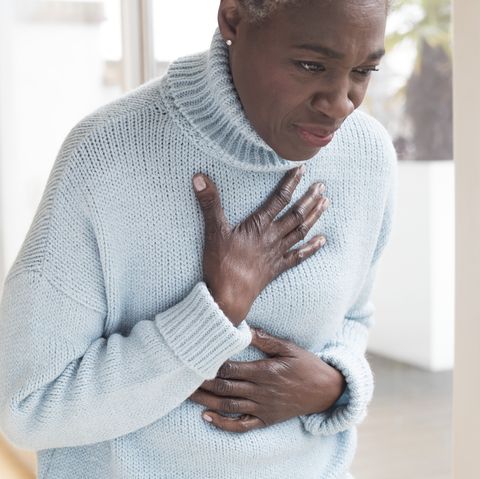I hope you’ve never had a heart attack. I also hope you’ve never had a panic attack. That’s because they both feel awful — and have some of the same or very similar symptoms. But only one is imminently dangerous, and that’s a heart attack. A panic attack, on the other hand, may make you feel like you’re having a heart attack (or something is terribly wrong with your physical health), but it’s typically gone in roughly 20 minutes, with no negative impact on your body except maybe the need to take a nap because all that adrenaline coursing through your veins can wipe you out.
Knowing which one you’re experiencing, of course, would be very helpful. If it were a panic attack — scary though as it feels while you’re going through it— you would ride it out knowing that soon you’ll be kicking back watching Ted Lasso try to understand his own panic attacks. It would also save you a trip to the emergency department — about a quarter of the people who show up at the ER with chest pain are actually having panic attacks, research shows.
And if you knew you were having a heart attack, you wouldn’t worry about being alarmist in calling 911 or write your heart attack symptoms off to COVID-19, the flu or general exhaustion, as Yale research shows younger women often do. Women in general don’t fare as well after a heart attack for a number of reasons, studies show, and wait longer to call for help than men. That may be partly why heart disease remains the number one killer of women, according to the Centers for Disease Control.
What exactly is a heart attack and what are the symptoms?
A heart attack occurs when an area of your heart doesn’t get the blood supply it needs to stay healthy, says Karol Watson, M.D., Professor of Medicine/Cardiology at the David Geffen School of Medicine at UCLA. Deprived of blood for any length of time, that area of your heart muscle gets weaker and eventually dies. And unlike your abs when you slack off your crunches, the heart muscle cannot come back, although other areas of your heart may be able to compensate, she says.
The symptoms of a heart attack in women, are as follows:
- Chest pressure, tightness, palpitations or sharp pain
- Nausea, indigestion, stomach pain or some acid reflux
- Discomfort in arms, neck, jaw or back
- Fatigue
- Shortness of breath
- Dizziness or fainting
- Cold sweat and paleness
What is a panic attack and what are the symptoms?
A panic attack is when you — usually all of a sudden — feel incredibly scared or uncomfortable, typically for around 10 or 15 minutes, before you start to feel better. A panic attack is a fear reaction that can cause real physical symptoms, but what is scaring you are your own thoughts, says Wilson.
While you’re having it, the symptoms of a panic attack are:
- Palpitations
- Sweating
- Trembling or shaking
- Sensations of shortness of breath
- Feelings of choking
- Chest pain
- Nausea or GI upset
- Dizziness or lightheadedness
- Chills or heat
- Numbness or tingling
- Feeling of unreality or that the person is detached from themselves
- Fear of losing control or fear of dying.
As you can see from the above, chest pain or discomfort, palpitations, dizziness, tingling, nausea or stomach pain, sweating, and shortness of breath are symptoms that panic attacks and heart attacks have in common. Naturally, both can also leave you fearful, with a feeling of impending doom.
Is there a way to tell if my symptoms are heart problems or anxiety?
There are certainly clues that you’re experiencing one or the other, says Reid Wilson, Ph.D., a licensed psychologist who directs the Anxiety Disorders Treatment Center in Chapel Hill and Durham, NC, and the director of Anxieties.com. Depending on who you are, your medical history and what, exactly, you’re feeling, you can get a sense that it’s more likely that you are having one or the other, he says.
But here’s the thing: “You can’t confirm it,” he says. That’s why, he says, “No matter who you are, if you think you’re having a heart attack, you should get emergency care, period.”
Cardiologists likewise want to make sure you hear that message loud and clear. “If someone is not sure, they should seek immediate medical attention, including calling 911,” says Glenn Levine, MD, Master Clinician and Professor of Medicine, Baylor College of Medicine in Houston, and a scientific statement lead for the American Heart Association. “That’s because if it is a heart attack, every minute counts,” he adds.
You may not know with absolute certainty that you’re having a panic attack and not a heart attack, but there are some hints.
- If chest discomfort is sharp and stays in the chest, it’s likely panic. “During a heart attack, the pain can radiate to other areas of the body like the arm, jaw or neck,” says Wilson. Some people have pain elsewhere in the body during a panic attack, but it’s less typical.
- If symptoms hit you when you’re at rest, it’s also more likely panic. “A heart attack often develops during physical exertion, when the workload of the heart increases. A panic attack can occur at rest,” says Wilson. A panic attack may also come on when you’re feeling emotionally overwhelmed or gearing up to make a big decision with major consequences.
- If you’re relatively young and healthy, with no or few risk factors for heart disease, the odds are good it’s not a heart attack. Those who are younger than 40 years old, especially those who are generally healthy, are significantly less likely to have a heart attack than those who are older, says Wilson. That said, it’s still possible, Wilson emphasizes, so if you’re not sure, don’t blow it off.
- If you have been diagnosed with panic disorder, or “If you’ve had panic attacks, and you have the same symptoms as when doctors have diagnosed your symptoms as a panic attack, this would suggest that it’s another panic attack,” says Dr. Levine. Of course, a person who has panic attacks is not immune to a heart attack, he adds, so pay attention to exactly what you’re feeling. If the symptoms feel different (say, different type of discomfort in your chest, or shortness of breath that you don’t have during panic attacks) “then that would raise a concern of the possibility of a heart attack,” he says.
- If you have panic attacks during the day and then are then awoken with symptoms, it’s probably a panic attack. “While both panic attacks and heart attacks can wake you up from sleep, typically people who have nocturnal panic attacks also have daytime panic attacks,” says Wilson. If you’re not prone to daytime panic attacks and are woken up with symptoms, calling 911 is a smart move.
What happens in the ER if you have symptoms of a heart attack or panic attack?
If you head to the ER with any of the symptoms above, a triage nurse or emergency physician will take steps to diagnose or rule out a heart attack, says Dr. Levine. They’ll start by talking to you about how your symptoms came on, exactly what they feel like, and about your health history. Then they will likely give you an electrocardiogram (EKG) which measures electrical signals in your heart, and test your blood levels of the protein troponin, the presence of which can indicate damage to your heart. If they’re still not sure, there are further tests they can do to figure out if you’re having a heart attack or whether something else may be going on.
After they rule out a heart attack or another physical cause of your chest pain and other symptoms, doctors may raise the possibility that you’re having a panic attack. The treatment for panic attacks — particularly if they’re frequent and disruptive enough to qualify as panic disorder — is therapy and/or medications, as well as various mindfulness practices such as meditation which can help you tolerate the feelings of fear until they pass and become less frequent.
Why some people think their panic attack is a heart attack:
Not only do panic attacks and heart attacks feel similar, people who are prone to panic attacks — particularly those who have cardiophobia — often have a hard time trusting that their symptoms are coming from panic and not from a heart attack, even if they’ve been through it before.
That’s because panic disorder makes you believe you need absolute certainty that you’re NOT having a heart attack for you to feel relief, says Wilson. Even if you’ve gone to the ER three times thinking you were having a heart attack, and been tested to rule out a physical condition, a person with panic disorder may see a new episode as a distinct event. “They think, that was then, this is now — what if it is a heart attack this time and I’m missing it?” he explains.
One more time, with feeling: If you’re having ambiguous symptoms that scare you — especially if they feel different from your last panic attack — call 911.
But if you are in good health and think there’s a decent chance that your brain is messing with you — especially if it has in the past and you’ve been reassured that you don’t have a heart problem — you may need practice sitting with these symptoms so they can pass, and not escalating them with your fear. “At some point you have to say to yourself, here’s my tendency, here’s my pattern,” says Wilson. “I need to start trusting in what others have said to me, because I can’t trust what my mind is doing in those moments.”
Can a panic attack cause a heart attack?
All that fear and chest discomfort that feels like a heart attack makes some people wonder whether the panic attack itself can trigger a heart attack. And if you’re prone to panic, “If I don’t calm down I will give myself a heart attack!” isn’t exactly a calming thought.
So can a panic attack cause a heart attack? The short answer is no, says cardiologist Dr. Levine. “In general a panic attack should not cause a heart attack,” he says. The reason it may feel that way is because during a panic attack, the adrenaline coursing through your body can cause your heart rate and blood pressure to go up, he says. A stress response like this can also cause chest pain.
But that fear response is different from something (typically plaque in your arteries, built up over time) blocking your heart from getting the oxygen-rich blood it requires to stay healthy.
How to cope with a panic attack:
Below, Wilson’s tips for getting through a panic attack in the moment, no matter what is making you panic:
- Don’t fall for it! Once your MD gives you a clean bill of health, challenge those catastrophic thoughts that you are dying or having a heart attack. Label it as panic trying to scare you.
- It’s OK! Don’t fight the uncomfortable physical symptoms. Your best strategy is to accept them for what they are: as a normal bodily reaction to your fearful thoughts of “danger ahead!”
- Wait it out. Panic will yell, “Do something!” in your mind. Try the opposite. When possible, stay in the situation, quiet your racing thoughts and take some calm breaths.
- Be proactive. Panic causes you to fear you will embarrass yourself, or make some terrible mistake. Plan how you will successfully cope with such an unlikely event. Then you won’t be blackmailed by fear.
- Keep building your courage. After an anxiety attack, your impulse will be to avoid similar situations in the future. Your best strategy is to move toward that which you fear. In general, follow this rule: be scared and do it anyway.
Bottom line:
If you have symptoms that could be a heart attack, call 911. But if you know you are prone to panic attacks and have gotten reassurance from your doctor that you have no heart issues, you might remind yourself of what a panic attack feels like, take some deep breaths and see if the feelings subside. If you are having trouble managing your anxiety or panic, let your primary care provider know. He or she can refer you to a therapist who can teach you the skills to dial them down.
This content is created and maintained by a third party, and imported onto this page to help users provide their email addresses. You may be able to find more information about this and similar content at piano.io



